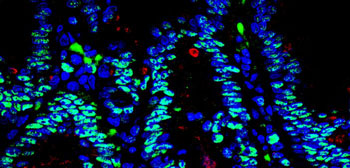Maintaining Normal Paneth Cell Levels Prevents Intestinal Bowel Disease
By LabMedica International staff writers
Posted on 06 Oct 2016
The enzyme PKC-lamda/iota (protein kinase C-lamda/iota) plays a critical role in the intestinal epithelium where it influences development of inflammatory diseases and cancer through its regulation of Paneth cell metabolism.Posted on 06 Oct 2016
Paneth cells are a highly specialized population of intestinal epithelial cells located in the crypt adjacent to Lgr5+ stem cells, from which they differentiate through a process that requires downregulation of the Notch pathway. Their ability to store and release antimicrobial peptides protects the host from intestinal pathogens and controls intestinal inflammation.

Image: As IBD worsens, levels of the gene regulator EZH2 increase, lowering numbers of protective Paneth cells (Photo courtesy of Sanford Burnham Prebys Medical Discovery Institute).
Investigators at the Sanford Burnham Prebys Medical Discovery Institute (La Jolla, CA, USA) reported in the September 20, 2016, online edition of the journal Cell Reports that PKC-lamda/iota was required for Paneth cell differentiation through the control of the enzyme EZH2 (Enhancer of zeste homolog 2) stability by direct phosphorylation. The selective inactivation of PKC-lamda/iota in epithelial cells resulted in the loss of mature Paneth cells, increased apoptosis and inflammation, and enhanced tumor formation.
The investigators found that PKC-lamda/iota expression in human Paneth cells decreased with the progression of Crohn’s disease, a chronic inflammatory condition. In addition, survival analysis of colorectal cancer patients revealed that low PRKC-lamda/iota levels correlated with significantly worse patient survival rates.
Blocking activity of EZH2 enabled the number of Paneth cells to return normal, so drug treatment to inhibit EZH2 could be a new approach for slowing the progression of inflammatory bowel disease (IBD), such as Crohn's disease. EZH2 has been an attractive target for anti-cancer therapy because it helps cancerous cells divide and proliferate. It is found in larger amounts than in healthy cells in a wide range of cancers including breast, prostate, bladder, uterine, and renal cancers, as well as melanoma and lymphoma. EZH2 is a gene suppressor, so when it becomes overexpressed, many tumor suppressor genes that are normally turned on, are turned off. Inhibition of EZH2 function shrinks malignant tumors in some reported cases because those tumor suppressor genes are not silenced by EZH2.
“The intestine is protected by specialized cells, called Paneth cells, that secrete antimicrobial peptides,” said senior author Dr. Jorge Moscat, professor in the NCI-designated cancer center at the Sanford Burnham Prebys Medical Discovery Institute. “We found that maintaining normal numbers of Paneth cells requires PKC-lambda/iota, and that the amount of PKC-lambda/iota decreases as IBD gets worse. We also discovered a way to prevent Paneth cell loss - inhibiting a protein called EZH2, which could be a new therapeutic strategy for IBD. EZH2 inhibitors are currently being developed by the pharmaceutical industry to treat other cancers, so they could be tested for IBD relatively soon. But first, we need to do preclinical studies to test whether they block progression of the disease.”
Related Links:
Sanford Burnham Prebys Medical Discovery Institute













